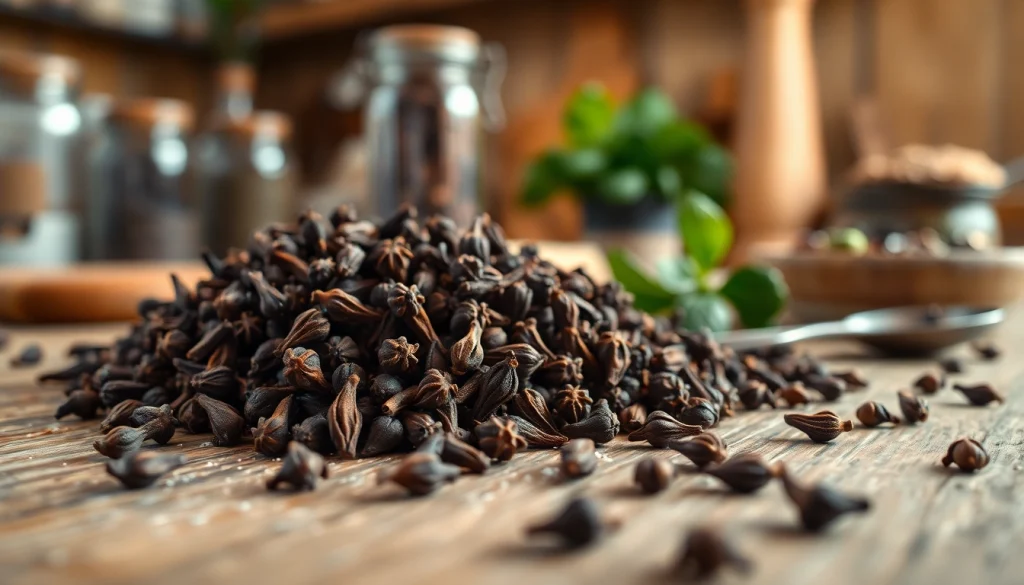
Understanding Cloves: Origins and Characteristics
The Botanical Background of Cloves
Cloves are the aromatic flower buds of the evergreen tree Syzygium aromaticum, a member of the Myrtaceae family. Native to the Maluku Islands, also known as the Spice Islands of Indonesia, cloves have been a cherished spice for centuries, not only for their flavor but also for their medicinal properties.
The clove tree can grow up to 20 meters tall and requires a tropical climate to thrive. The flower buds are harvested when they are still immature, dried in the sun, and then used as a spice. This spice has a distinctive dark brown color and a powerful aroma that is warm and slightly sweet, making it a favorite in kitchens worldwide.
Types of Cloves and Their Unique Features
There are primarily two types of cloves available in the market: Ceylon cloves and Indonesian cloves. Ceylon cloves, often referred to as Syzygium aromaticum, are known for their superior quality, higher eugenol content, and sweeter flavor profile. In contrast, Indonesian cloves are more pungent and slightly bitter, which makes them suitable for certain culinary applications.
The choice of clove type can significantly affect both taste and health benefits, so understanding the nuances between these varieties is essential for chefs and health enthusiasts alike.
Culinary Applications in Global Cuisine
Cloves have a prominent place in global cuisine. They are an essential ingredient in spice blends such as garam masala and are frequently used in Indian and Middle Eastern dishes. In Western cuisines, cloves often flavor dishes during the holiday season, particularly in gingerbread cookies, mulled wine, and hams.
Cloves contribute a warm, aromatic kick that many find irresistible. Their oil can also be used to infuse spirits and syrups, adding complexity to cocktails and desserts.
Health Benefits of Cloves
Rich Nutritional Profile of Cloves
Cloves are not just a flavor enhancer; they also boast an impressive nutritional profile. They contain essential nutrients such as fiber, vitamins C and K, calcium, iron, and manganese. Manganese is a mineral that plays a crucial role in bone health, metabolism, and the formation of connective tissue. The presence of vital antioxidants helps combat oxidative stress, potentially lowering the risk of chronic disease.
How Cloves Support Immune Health
The immune-boosting properties of cloves are primarily attributed to their high antioxidant content. Eugenol, the most abundant compound in clove oil, exhibits antibacterial and antiviral properties, making them an excellent choice for fighting infections and supporting overall immune function. Regular consumption of cloves may reduce the risk of countless ailments, including colds and respiratory infections.
Potential Role in Pain Management
Cloves are renowned for their analgesic properties. The eugenol in cloves mimics the action of some pain-relieving medications, making them an effective natural remedy for toothaches and headaches. Clove oil can be applied topically to sore muscles, providing relief from discomfort through the warming sensation it produces.
Using Cloves in Cooking
Incorporating Cloves into Recipes
Incorporating cloves into your culinary repertoire is simple and rewarding. Start by using whole cloves in your dishes—just a few can significantly enhance the flavor profile of soups, stews, roasted meats, and baked goods. Ground cloves are better suited for applications where dispersion of flavor is desired, such as in cookies, cakes, and spice blends.
Popular Dishes Featuring Cloves
Some popular dishes that prominently feature cloves include:
- Gingerbread Cookies: A classic pastry for the holidays that gets its robust flavor from a blend of spices, including cloves.
- Mullled Wine: A warm beverage steeped with spices, cloves contribute to the deep, aromatic flavor.
- Indonesian Nasi Goreng: Here, cloves add a distinctive essence to the fried rice dish, elevating its flavor complexity.
- Braised Lamb Shanks: Used in Moroccan cuisine, cloves enhance the savory richness of the dish.
Tips for Cooking with Cloves
When using cloves in cooking, it’s essential to balance their intense flavor. Here are some tips:
- Use them sparingly: A little goes a long way.
- Remove whole cloves from dishes before serving, as they can be quite strong when bitten.
- Pair cloves with other spices like cinnamon, nutmeg, and allspice to create a well-rounded flavor.
Cloves and Aromatherapy
Essential Oil Uses of Cloves
Clove essential oil is a popular choice in aromatherapy for its warming scent and health properties. It can be used in diffusers, added to bathwater, or mixed with carrier oils for massages. The oil is believed to uplift mood, alleviate stress, and improve mental clarity. Additionally, it is often incorporated into natural cleaning products for its antimicrobial properties.
Cloves for Relaxation and Stress Relief
The soothing aroma of cloves can help create a calming atmosphere. When diffused, clove oil may promote relaxation and help reduce anxiety levels. Its spicy scent also has the potential to inspire feelings of comfort, making it an excellent choice for adding to your relaxation routines, such as meditation or hot baths.
Homemade Clove Infusions and Remedies
Home remedies using cloves are simple to create. You can make clove-infused oil for soothing muscle pain or clove tea for digestive support. To make clove tea, steep whole cloves in boiling water for 10 minutes, then strain and enjoy. This infusion can help with digestive issues, cold symptoms, and even as a general wellness tonic. Always consult with a healthcare provider before using cloves medicinally, as they can interact with medications and may not be suitable for everyone.
Buying and Storing Cloves
Choosing Quality Cloves: What to Look For
When purchasing cloves, it’s important to look for quality over quantity. Select undamaged, whole cloves with a strong aroma. If buying ground cloves, ensure the powder is fine and has a vibrant color without any musty smell. Organic cloves tend to be a safer option, as they are grown without harmful pesticides and chemicals.
Best Practices for Storage
Proper storage of cloves is vital to preserve their flavor and aroma. Store whole cloves in an airtight container in a cool, dark place; they can last for several years this way. Ground cloves, however, should be used within six months to a year for optimal freshness. Keeping them away from light and heat is essential to prevent them from losing potency.
Common Misconceptions about Cloves
One common misconception is that all cloves are the same—however, this is far from the truth. Cloves can vary significantly in flavor and quality based on their origin and harvesting practices. Additionally, there are myths regarding the health risks associated with consuming cloves, particularly concerning their use in traditional medicine. While cloves do have medicinal properties, they should be used appropriately and in moderation. Excessive consumption may lead to adverse effects, including gastrointestinal discomfort.






